You only need 7 ingredients to make these dinner rolls. Flaky, soft, and buttery, these fresh dinner rolls outshine any main dish. If you’re a bread beginner, read this blog post to learn more about the yeast rolls recipe, including how to prep the rolls ahead of time. You can also reference my Baking with Yeast Guide for answers to common yeast FAQs.
This recipe is brought to you in partnership with Red Star Yeast.
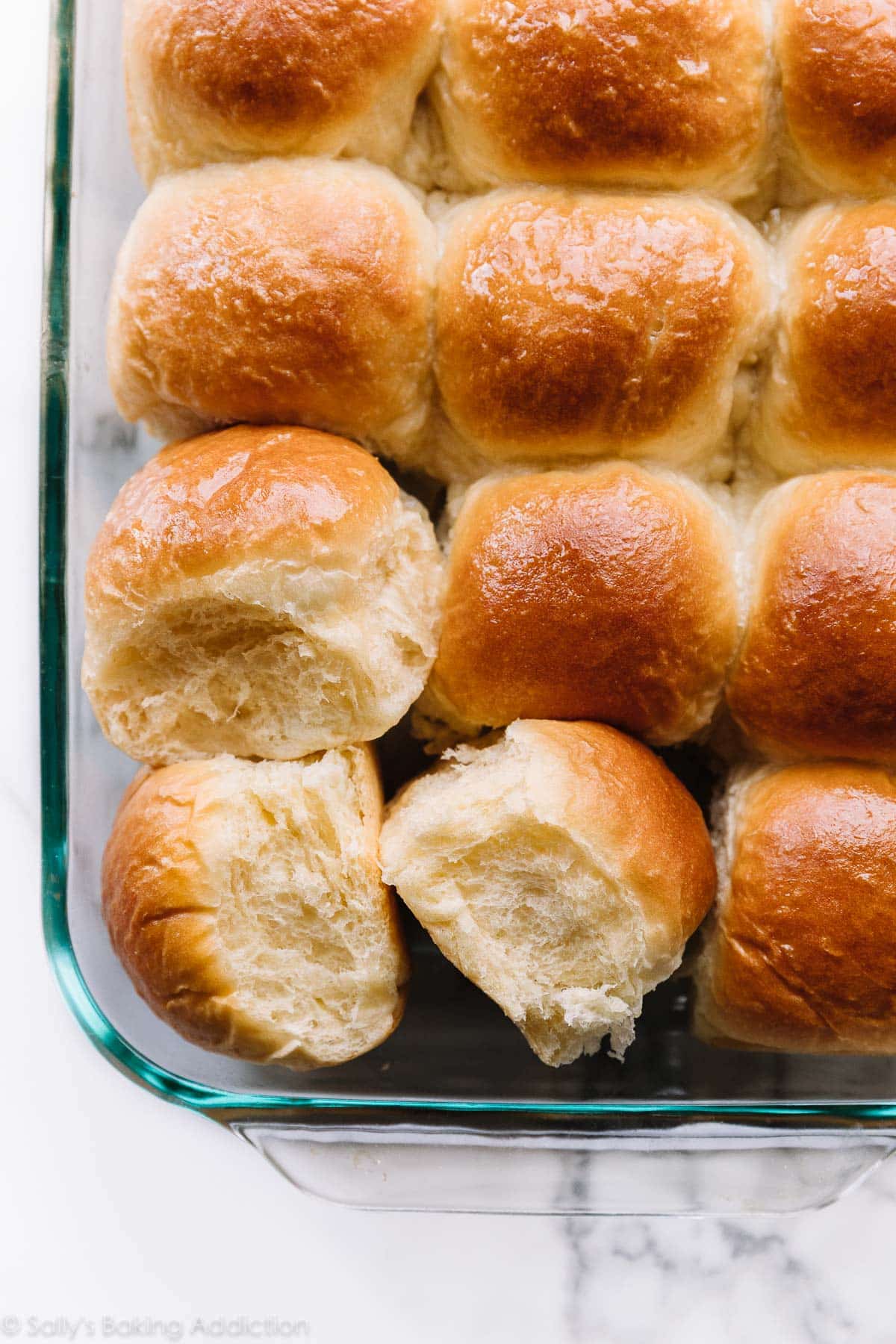
- Do you long to bake homemade bread but are too intimidated to start?
- Does yeast dough send you running for the hills?
- Do bread recipes seem overly complicated and confusing?
I’m teaching you how to make homemade dinner rolls. These are the best homemade dinner rolls I’ve ever had and it all starts with a straightforward 7-ingredient dough. I make these rolls whenever I get the chance and even brought a pan to our friends who just welcomed a baby. They’re pillow-soft with the most delicious flaky and buttery texture. Everyone will demand you bake them on repeat.
And with this recipe, I guarantee you will finally feel confident baking bread. 🙂
This recipe is such a fan favorite, that it deserved a spot in print! You’ll also find this recipe in my cookbook, Sally’s Baking 101.
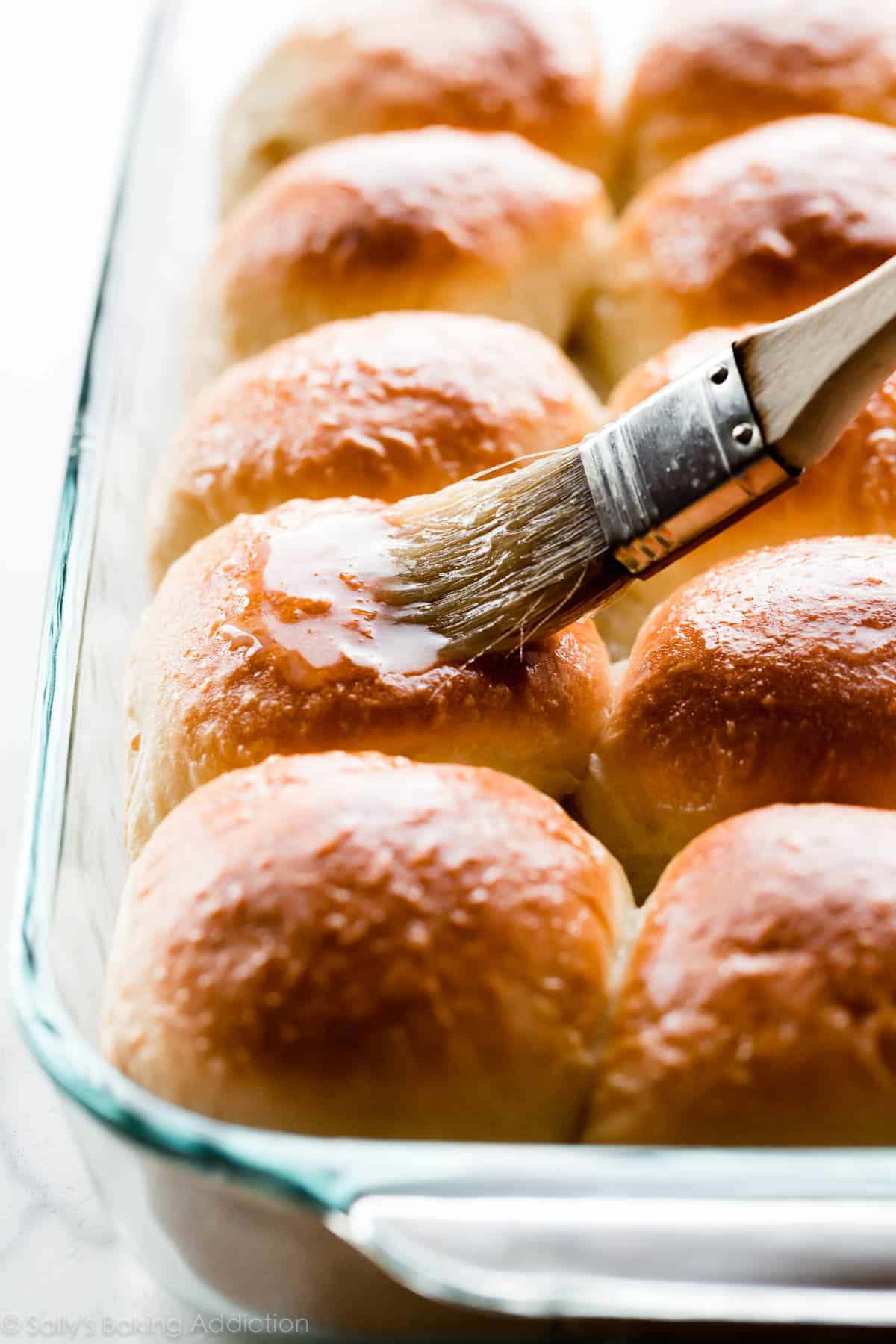
Video Tutorial: Dinner Rolls
Let’s start with a video tutorial.
Overview: How to Make Homemade Dinner Rolls
- Make the dough. Continue below to learn more about this dough recipe.
- Knead the dough. Reference my How to Knead Dough video tutorial if you need extra help with this step.
- Cover the dough and let it rise. The dough rises in about 1-2 hours in a relatively warm environment.
- Punch down the dough to release the air and shape into rolls.
- Let the rolls rise for about 1 hour.
- Bake for 20-25 minutes until golden brown. If desired, brush the warm rolls with a little honey and melted butter for extra flavor.
As shown in the video tutorial, the dough comes together with a mixer. You can use a paddle attachment or a dough hook. You can also make the dough by hand, but it requires a bit of arm muscle. After the dough comes together in the mixing bowl, it’s time to knead. You can simply continue beating the dough with the mixer for this step or you can knead the dough by hand. I chose to knead the dough by hand so you can see me doing it in the video above.
If you’re new to bread making, my How to Knead Dough post and video can help even more with this step. And my Baking with Yeast Guide is a wonderful resource for all bread beginners!
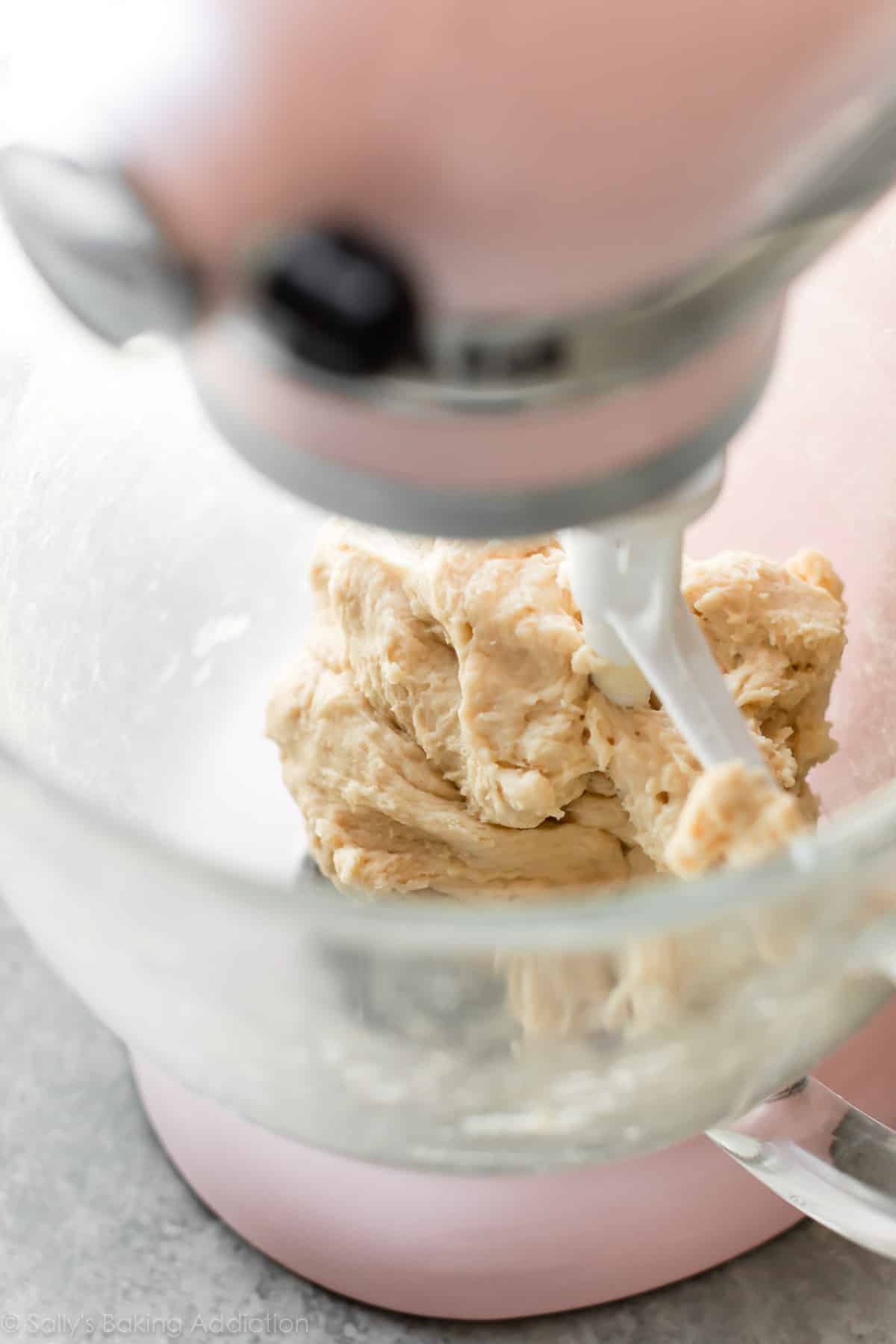
Soft Dinner Rolls Require a Rich Dough
The crustier and chewier the bread, the less fat in the dough. This is known as a lean dough. The softer and richer the bread, the more fat in the dough. This is known as a rich dough. Unlike chewy homemade bagels, focaccia, ciabatta, and my artisan bread, soft dinner rolls require a rich dough. Unfortunately, this doesn’t mean that the dough is swimming in cash. Rather, “rich” correlates with the amount of fat. For example, this dough has milk, butter, and egg.
You need 7 ingredients total. They’re the same ingredients in my easy cinnamon rolls and homemade brioche, which are also rich doughs. (Though I use more sugar for sweeter cinnamon rolls, of course.)
- Milk: Liquid activates the yeast. For the softest dinner rolls, use whole milk. Nondairy or low fat milks work too, but whole milk produces phenomenal flavor and texture.
- Yeast: You can use active dry yeast or instant yeast. If using active dry yeast, the rise times will be a little longer. I recommend Platinum Yeast from Red Star, which is an instant yeast blended with natural dough improvers.
- Sugar: Sugar feeds the yeast, increases its activity, and tenderizes the dough.
- Egg: 1 egg provides structure and flavor.
- Butter: Butter promises a flavorful and soft dinner roll. Make sure it’s room temperature.
- Salt: You can’t make flavorful bread without salt!
- Flour: You can use all-purpose flour or bread flour in this recipe. All-purpose flour is convenient for most, but bread flour produces chewier dinner rolls. There are no other changes to the recipe if you use bread flour.
Once you make the dough, let it rise:
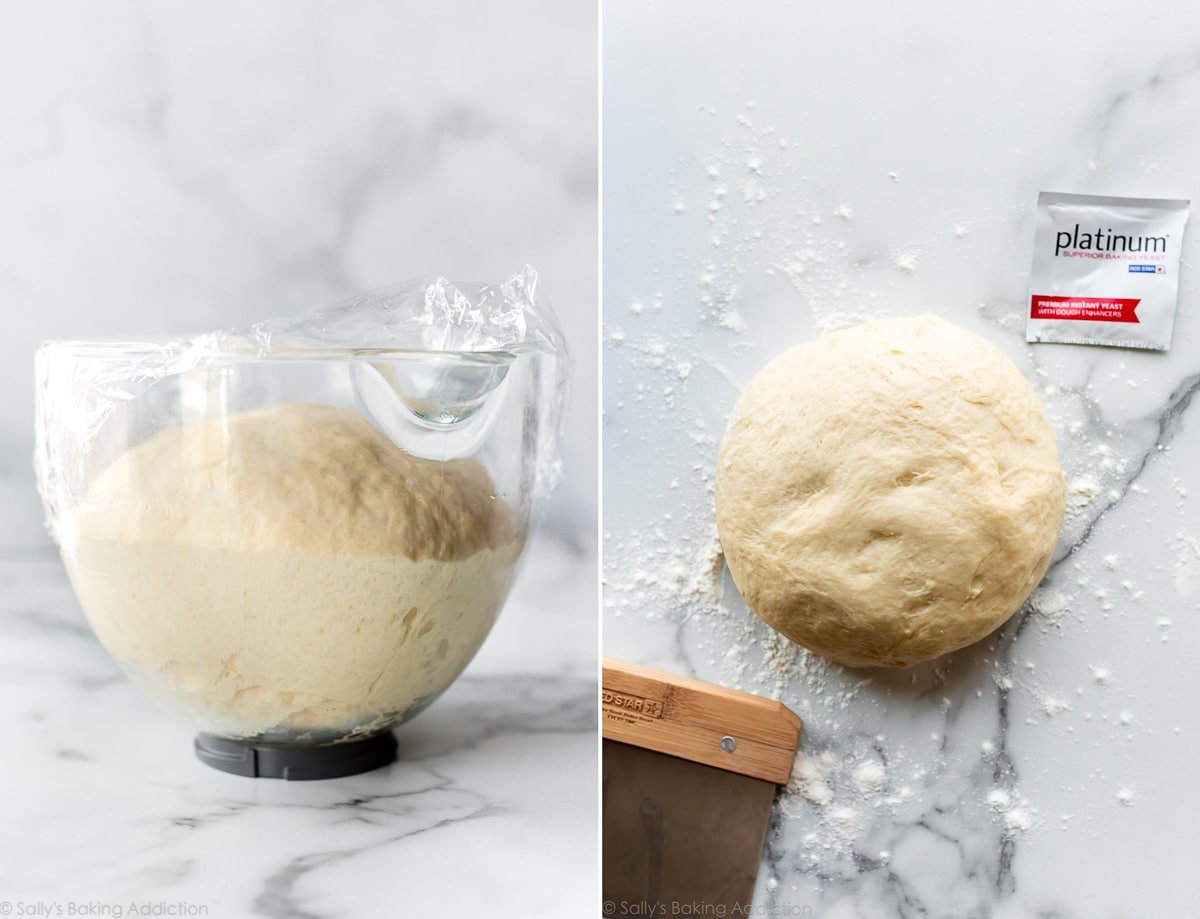
After that, punch down the risen dough. Shape into balls and arrange in a baking pan. Don’t worry if they’re not all uniform in size.
Let the shaped rolls rise before baking. Look how puffy they get after 1 hour of rising:
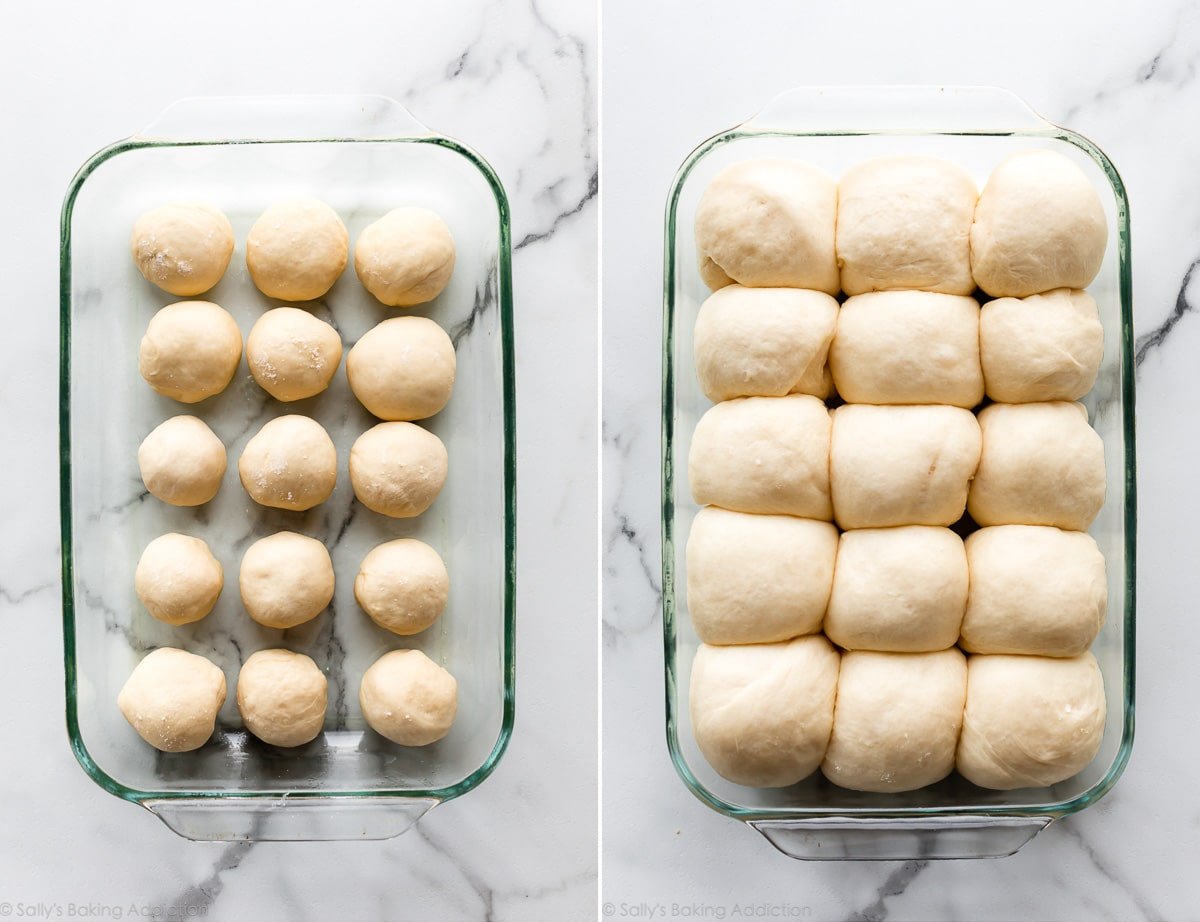
How to Shape Dinner Rolls
You can shape this dough many different ways including twisted rolls, knotted rolls (how I shape garlic knots), cloverleaf rolls, or even hot dog buns. Let’s stick with the basic round shape. Divide the dough into 14-16 pieces. Take a piece and stretch the top of the dough while pinching and sealing the bottom. Make sure the rolls are smooth on top and sealed on the bottom. I shape hot cross buns the same exact way.
How to Make Yeast Rolls Ahead of Time
The rolls require around 3 hours of rising. Not everyone has 3 hours to spare, so let’s discuss another option! Prepare the dough, let it rise, and shape the rolls. Cover the shaped rolls tightly and refrigerate for up to about 16 hours. At least 3 hours before you need them the next day, remove the rolls from the refrigerator and allow to rise on the counter for about 1-2 hours before baking.
And here’s how to freeze dinner rolls: Follow the make-ahead instructions and instead of refrigerating overnight, freeze the rolls in a baking pan. Once frozen, they won’t stick together anymore and you can place them in a freezer bag. Let them thaw and rise for about 4-5 hours, then bake. You can also freeze the baked dinner rolls. Therefore, if you want a smaller batch, you can make the entire recipe and bake only a few fresh rolls at a time.
These make-ahead options are especially helpful if you want fresh-baked rolls for Easter brunch, Thanksgiving dinner, or on Christmas.
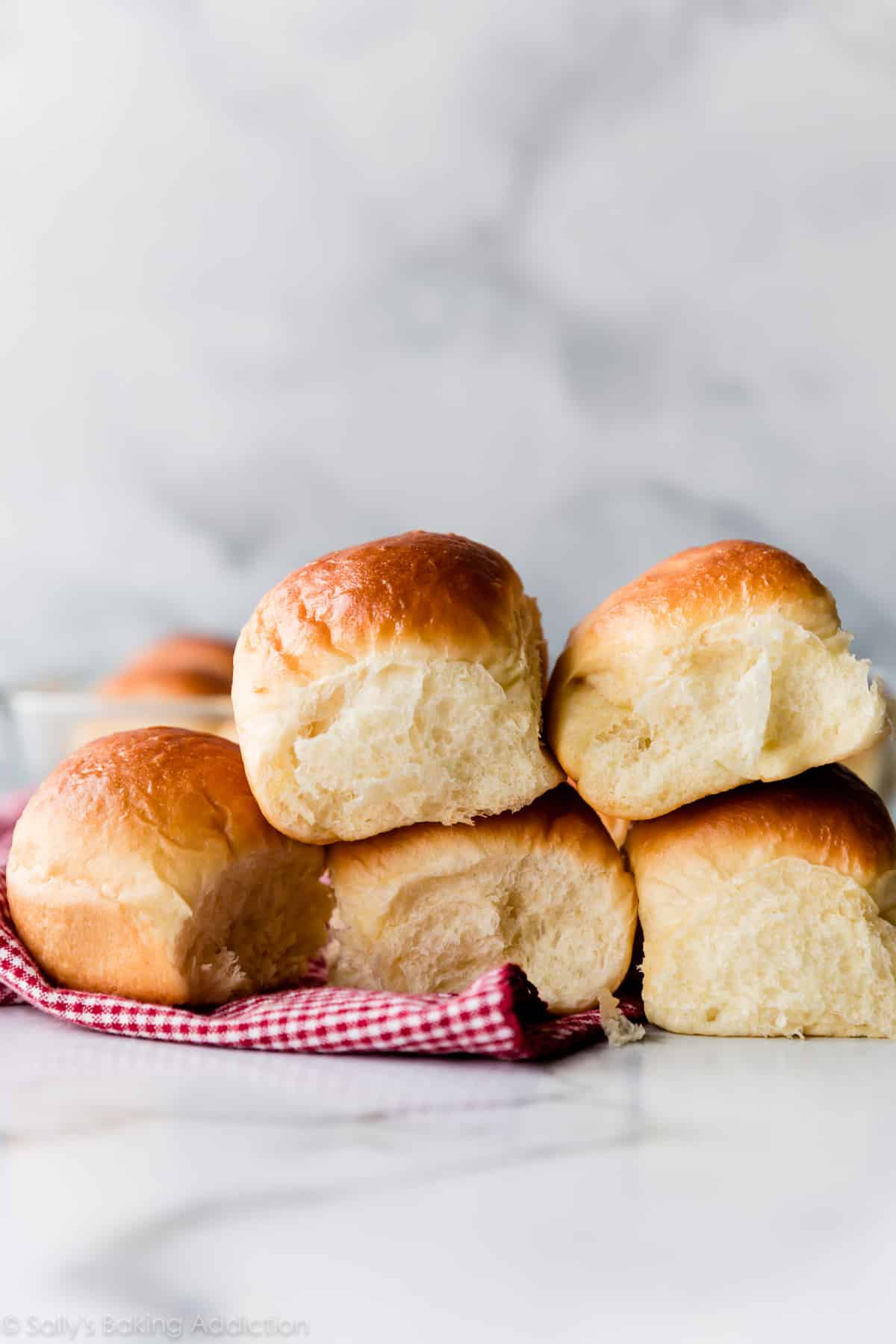
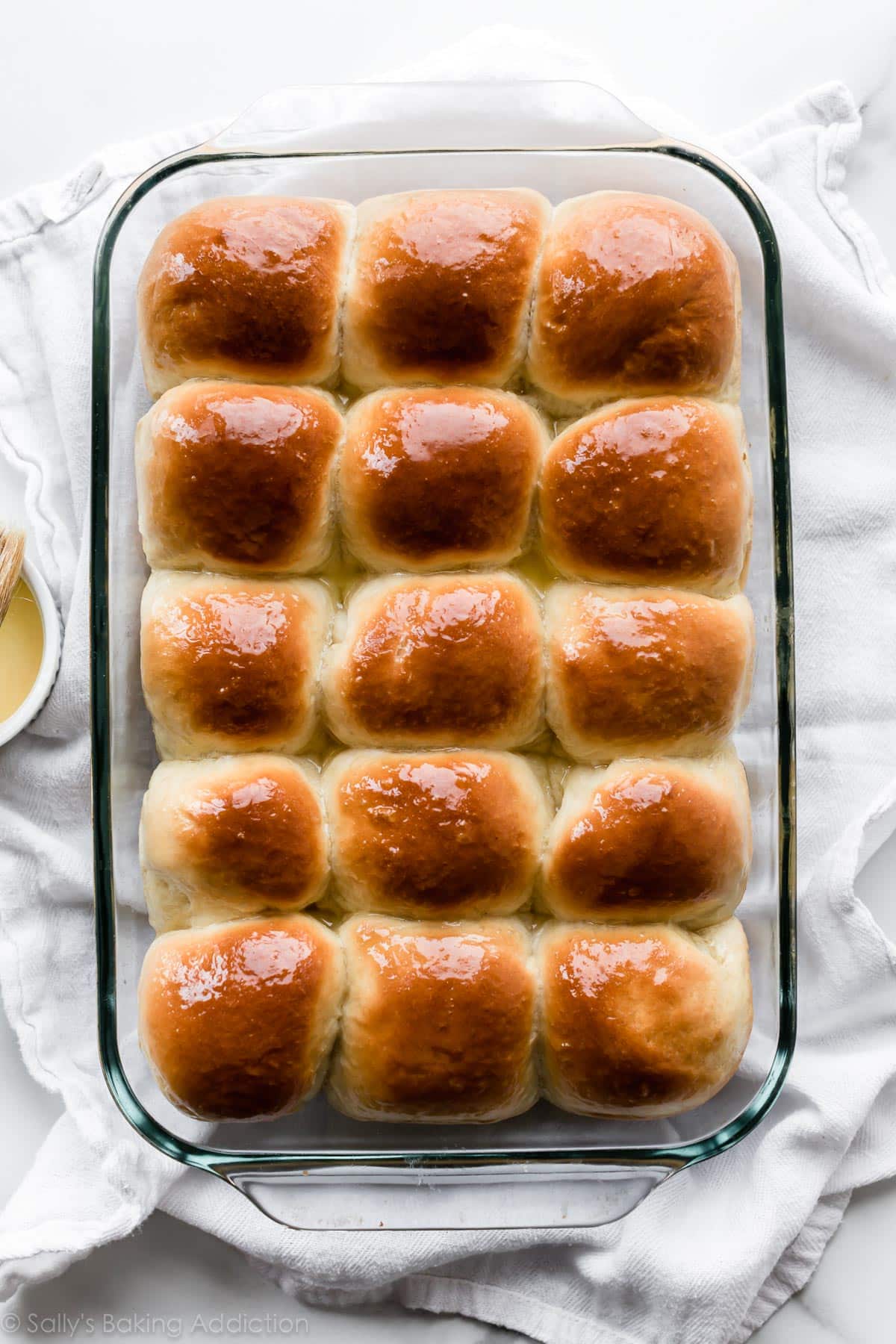
Dinner Roll Flavors
How about some pizazz? Mix in these ingredients when you add the flour.
- Rosemary Dinner Rolls – 2 Tablespoons fresh or dried chopped rosemary.
- Cheddar Dinner Rolls – 1 cup shredded cheddar cheese. Other cheese varieties work, but avoid super soft cheeses.
- Garlic & Herb Dinner Rolls – 2 teaspoons each: dried rosemary, dried basil, & dried parsley, along with 1 teaspoon garlic powder.
- Whole Wheat Dinner Rolls
- Brown Butter Sage Dinner Rolls
- Honey Butter Rolls
- Sweet Potato Dinner Rolls
- Multigrain Rolls – Here is my Multigrain Bread recipe that you can turn into rolls.
They’re also fantastic with a simple swipe of homemade honey butter or homemade cinnamon butter.
This dough is not ideal for a big loaf of bread. Instead, I recommend using a leaner dough, such as my sandwich bread or whole wheat bread recipes. If you need an egg free dough, try homemade breadsticks instead. And if you love pizza, try these pizza pull apart rolls next!
3 Success Tips
- Reference my Baking with Yeast Guide, which answers many common yeast FAQs.
- Make sure your yeast isn’t expired. Expiration date is on the package.
- Directly from the pros at Red StarYeast: Measuring flour correctly is key to avoiding a dense dough, which leads to heavy (not soft!) rolls. Spoon and level your flour, do not scoop it out of the package.
My final piece of advice? Don’t limit these rolls to suppertime. They’re welcome anywhere, with any meal, any time of day. Use for sliders, breakfast sandwiches, soaking up your favorite tomato sauce with slow cooker turkey meatballs, alongside salad, or dunking into a bowl of creamy chicken noodle soup. Above all, don’t doubt yourself because you, too, can become a bread baking pro.
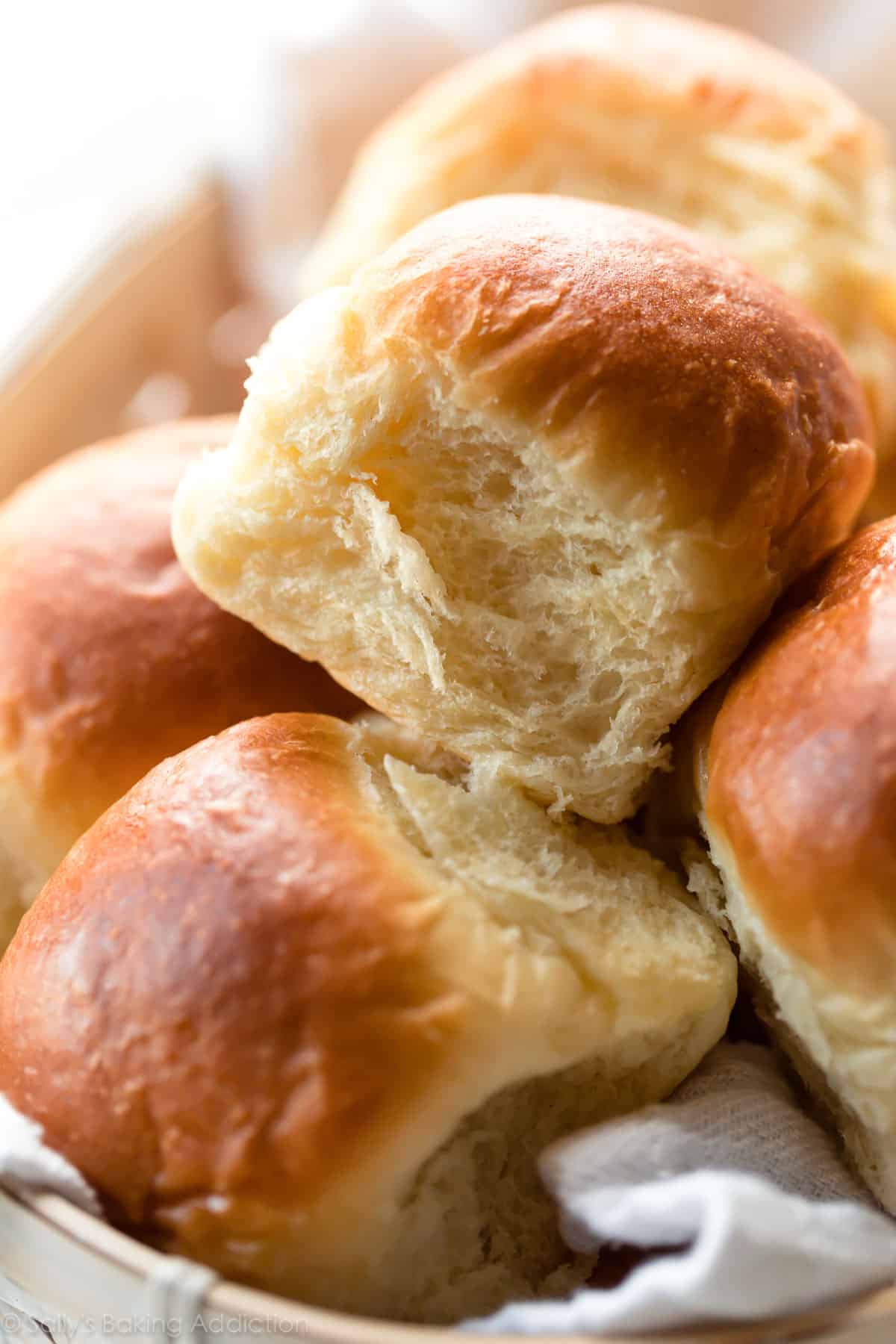
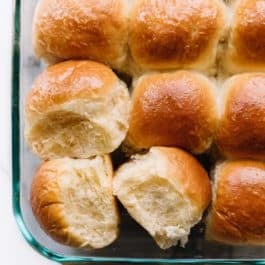
Soft Dinner Rolls Recipe
- Prep Time: 3 hours, 25 minutes
- Cook Time: 22 minutes
- Total Time: 3 hours, 45 minutes
- Yield: 14-16 rolls
- Category: Dinner
- Method: Baking
- Cuisine: American
Description
You only need 7 ingredients to make these dinner rolls. Flaky, soft, and buttery, these fresh dinner rolls outshine any main dish. See recipe notes for freezing and overnight instructions. You can also reference my Baking with Yeast Guide for answers to common yeast FAQs. This recipe is also in my cookbook, Sally’s Baking 101.
Ingredients
- 1 cup (240ml) whole milk, warmed to about 110°F (43°C)
- 2 and 1/4 teaspoons Platinum Yeast from Red Star instant yeast (1 standard packet)
- 2 Tablespoons granulated sugar, divided
- 1 large egg
- 1/4 cup (4 Tbsp; 56g) unsalted butter, softened to room temperature and cut into 4 pieces
- 1 teaspoon salt
- 3 cups (390g) all-purpose flour or bread flour* (spooned & leveled)
- optional topping: 2 Tablespoons (28g) melted unsalted butter mixed with 1 Tablespoon honey
Instructions
- Prepare the dough: Whisk the warm milk, yeast, and 1 Tablespoon of sugar together in the bowl of your stand mixer. Cover and allow to sit for 5 minutes. *If you do not own a stand mixer, you can do this in a large mixing bowl and in the next step, mix the dough together with a large wooden spoon/silicone spatula. It will take a bit of arm muscle. A hand mixer works, but the sticky dough repeatedly gets stuck in the beaters. Mixing by hand with a wooden spoon or silicone spatula is a better choice.*
- Add the remaining sugar, egg, butter, salt, and 1 cup flour. With a dough hook or paddle attachment, mix/beat on low speed for 30 seconds, scrape down the sides of the bowl with a silicone spatula, then add the remaining flour. Beat on medium speed until the dough comes together and pulls away from the sides of the bowl, about 2 minutes. If the dough seems too wet to a point where kneading (next step) would be impossible, beat in more flour 1 Tablespoon at a time until you have a workable dough, similar to the photos above. Dough should be soft and a little sticky, but still manageable to knead with lightly floured hands.
- Knead the dough: Keep the dough in the mixer and beat for an additional 5 full minutes, or knead by hand on a lightly floured surface for 5 full minutes. (If you’re new to bread-baking, my How to Knead Dough video tutorial can help here.) If the dough becomes too sticky during the kneading process, sprinkle 1 teaspoon of flour at a time on the dough or on the work surface/in the bowl to make a soft, slightly tacky dough. Do not add more flour than you need because you do not want a dry dough. After kneading, the dough should still feel a little soft. Poke it with your finger—if it slowly bounces back, your dough is ready to rise. You can also do a “windowpane test” to see if your dough has been kneaded long enough: tear off a small (roughly golfball-size) piece of dough and gently stretch it out until it’s thin enough for light to pass through it. Hold it up to a window or light. Does light pass through the stretched dough without the dough tearing first? If so, your dough has been kneaded long enough and is ready to rise. If not, keep kneading until it passes the windowpane test.
- 1st Rise: Lightly grease a large bowl with oil or nonstick spray. Place the dough in the bowl, turning it to coat all sides in the oil. Cover the bowl with aluminum foil, plastic wrap, or a clean kitchen towel. Allow the dough to rise in a relatively warm environment for 1-2 hours or until double in size. (I always let it rise on the counter. Takes about 2 hours. For a tiny reduction in rise time, see my answer to Where Should Dough Rise? in my Baking with Yeast Guide.)
- Grease a 9×13 inch baking pan or two 9-inch square or round baking pans. You can also bake the rolls in a cast iron skillet or on a lined baking sheet.*
- Shape the rolls: When the dough is ready, punch it down to release the air. Divide the dough into 14-16 equal pieces. (Just eyeball it– doesn’t need to be perfect!) A bench scraper is always helpful for cutting dough. Shape each piece into a smooth ball. Arrange in prepared baking pan.
- 2nd Rise: Cover shaped rolls with aluminum foil, plastic wrap, or a clean kitchen towel. Allow to rise until puffy, about 1 hour.
- Adjust oven rack to a lower position and preheat oven to 350°F (177°C). (It’s best to bake the rolls towards the bottom of the oven so the tops don’t burn.)
- Bake the rolls: Bake for 20-25 minutes or until golden brown on top, rotating the pan halfway through. If you notice the tops browning too quickly, loosely tent the pan with aluminum foil. Remove from the oven, brush with optional honey butter topping, and allow rolls to cool for a few minutes before serving.
- Cover leftover rolls tightly and store at room temperature for 2-3 days or in the refrigerator for up to 1 week.
Notes
- Freezing Instructions: Prepare recipe through step 6. Place shaped rolls in a greased baking pan, cover tightly, and freeze for up to 3 months. Once frozen, the dough balls won’t stick together anymore and you can place them in a freezer bag if needed. On the day you serve them, arrange the dough balls in a greased baking pan, cover tightly, then let them thaw and rise for about 4-5 hours. Bake as directed. You can also freeze the baked dinner rolls. Allow them to cool completely, then freeze for up to 3 months. Thaw in the refrigerator or at room temperature, then reheat as desired. If reheating the whole pan, lightly cover and reheat in a 300°F (149°C) oven for about 10 minutes or until warm.
- Overnight Instructions: Prepare the recipe through step 6. Cover the shaped rolls tightly and refrigerate for up to about 15 hours. At least 3 hours before you need them the next day, remove the rolls from the refrigerator, keep covered, and allow to rise on the counter for about 1-2 hours before baking. Alternatively, you can let the dough have its 1st rise in the refrigerator overnight. Cover the dough tightly and place in the refrigerator for up to about 15 hours. Remove from the refrigerator and allow the dough to fully rise for 2 more hours. Continue with step 5.
- Special Tools (affiliate links): Electric Stand Mixer or Glass Mixing Bowl and Wooden Spoon / Spatula | 9×13-inch Glass Baking Pan | Bench Scraper | Pastry Brush
- Baking Pan: I prefer baking the rolls in a glass 9×13 inch baking pan because I find they brown a little too quickly in metal. As long as you bake the rolls on a lower oven rack and keep your eye on them, any pan is great.
- Yeast: Platinum Yeast from Red Star is an instant yeast. You can use Red Star Yeast active dry yeast instead. Rise times will be slightly longer using active dry yeast. Reference my Baking with Yeast Guide for answers to common yeast FAQs.
- Flour: You can use all-purpose flour or bread flour. All-purpose flour is convenient for most, but bread flour produces chewier dinner rolls. The rolls are still soft and fluffy no matter which you use. Either flour is fine and there are no other changes to the recipe if you use one or the other.
Adapted from Homemade Bread Bowls and Honey Butter Rolls




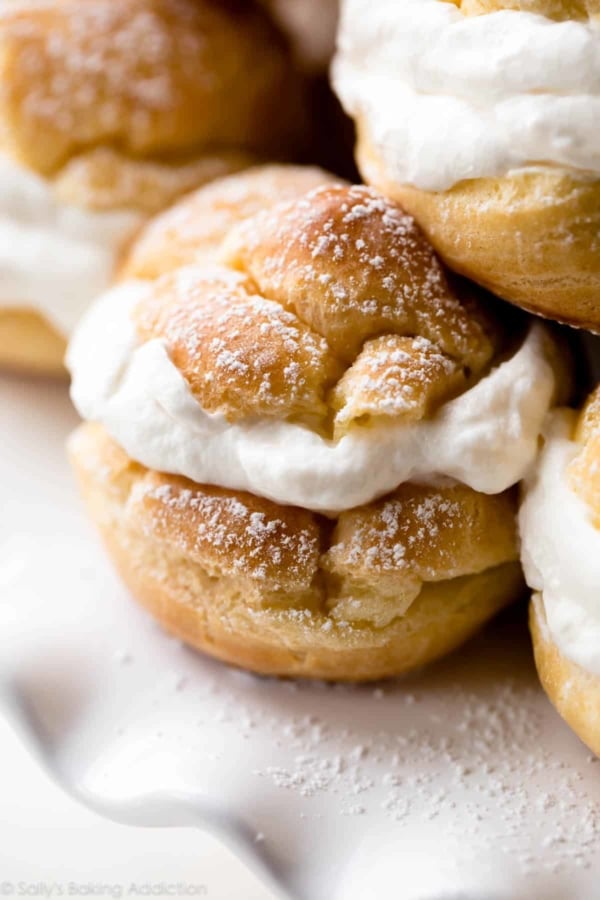












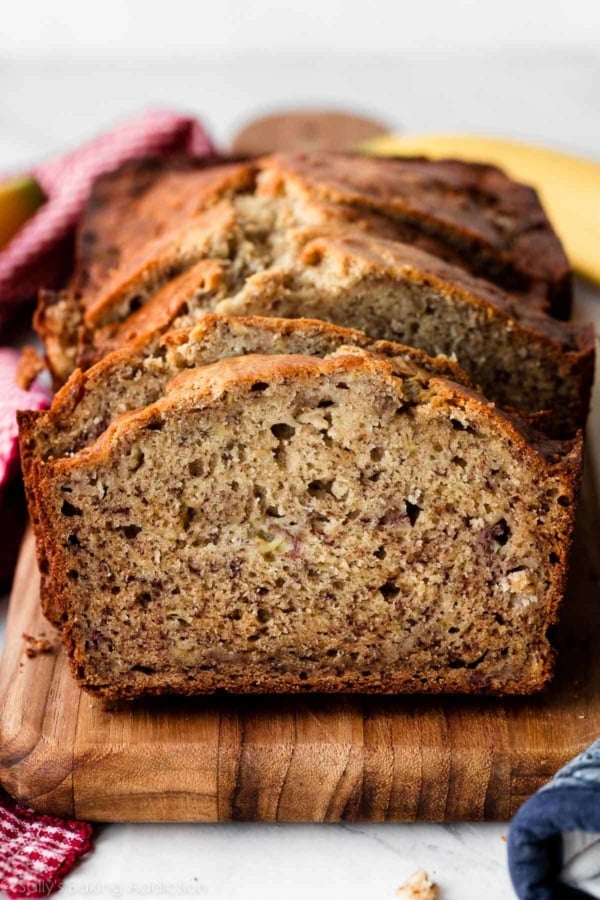

Reader Comments and Reviews
These rolls came out so delicious! I added cinnamon to the honey butter for the top coating and it was incredible. I won’t use any other recipe
Hi! I made them and delicious. But the tops of my rolls came out like a crust instead of soft and fluffy. Is there a reason for this?
Hi Sasha! Keeping them close together and baking for a shorter time should keep the exterior soft! It’s also possible that your oven runs a bit hot – have you run into similar issues in the past? We always recommend using an in-oven thermometer for most accurate baking, but you can also try turning your oven down by 10-15 degrees F. Hope this helps for next time!
Looks yummy!!! Can I make the dough ahead of time and bake on the next day?
Hi Julia, Yes! See the overnight instructions in the recipe notes below the recipes.
Hi. I made this recipe and I loved it! I want to double it. Is there anything I need to be aware of?
Hi Meg, For the best results, we recommend making separate batches rather than doubling.
Is it possible to halve the recipe? I’ve made them before and love them so much but I want to do half with rosemary and half without for thanksgiving due to some guests preferences. Any suggestions on how to achieve this?
Hi Sarah! You could make a full batch of dough, divide it in half after it comes together, and add rosemary to half the dough.
I forgot the butter. What will happen?
Hi Sara! The rolls will turn out but may not be as soft.
These came out absolutely amazing!!! Super fluffy and perfect. I didn’t have honey so I did a little maple syrup in the butter for the glaze and mmmm it was delicious.
I have skim, oat or heavy cream as milk options — of these three which do you recommend?
Hi Lauren, the skim milk will work.
You could also use 1/2 cup skim and 1/2 cup heavy cream.
Would this recipe work if I substitute the butter and milk with plant based options? Trying to make it dairy free
Hi Mj, some readers have made those substitutions with fine results. When using non-dairy milk, I find oat milk is the best choice.
Great recipe! Can I use half and half instead of whole milk?
Hi Michelle, you can certainly try it, but I find that half-and-half is too heavy for this dough. I recommend whole milk for best results.
Hi Sally! I make your sandwich bread all the time. I hoped these would have a similar taste because the ingredients are so similar, but my rolls came out less flavorful/almost a bit bitter. Any idea what might have gone wrong? Thank you!!
Hi Sara, I wonder why the rolls tasted bitter. Did you make any substitutes? Perhaps the dough didn’t rise long enough and you’re tasting a strong yeast flavor? Or it rose too quickly (in an environment that was too warm) and you’re getting a flavor/scent almost similar to alcohol? I’m happy to help troubleshoot.
My rolls came out like biscuits. Any idea why?
Hi Jenny, it could be 1 of 2 things, or both. (1) Did you knead your dough long enough? It should be stretchy and elastic after kneading. You can use the windowpane test or the poke test (if it bounces back without much sticking, it is ready). And/or (2) Did the rolls rise enough during both rises? You want it just about double in size in the 1st rise and nice puffy rolls in the 2nd rise.
Thank you. I didn’t do The tests to see if it was done but it looked stretchy and elastic. I’m trying again right now and using scale for flour as well, my 9yo said they tasted like too much flour lol
I used salted butter for this recipe plus the salt In recipe and they came out salty for my taste. Can I just omit the added salt and just use the salted butter
If using salted butter, you can reduce the added salt to 3/4 teaspoon, or leave it out if that suits your tastes. Enjoy!
Hi, Sally! Can these be baked in a muffin tin?
Hi Will! We haven’t tested this recipe in muffin pans but other bakers have reported success doing so. Let us know if you try!
Made these for friendsgiving as I am the “breadmaker” of the friend group, this was the best dinner roll recipe I’ve ever tried! Added the recipe to my cookbook!
I made these rolls for Thanksgiving dinner and they were a huge hit. Followed the recipe to a T except I used half and half instead of whole milk. Super easy to make and I got 15 perfectly shaped rolls in a 9×13 glass dish. My husband said they were the best rolls he’s ever had in his life! Thank you for making such an awesome roll recipe. Definitely a keeper!!
Any tips on how to double or triple this recipe? Pleaseee and thank you!
Hi Karen! We recommend making separate batches for best results.
If I’m taking to someone else’s house for Thanksgiving, which of the do-ahead ideas would you recommend to make sure they are as fresh and tasty as possible for the dinner?
Hi Cindy! We would follow the overnight instructions and bake them in the morning, before bringing to dinner later in the day!
Tested out this recipe and they were delicious ! Can I make these rolls the day before? I’m bringing them to someone’s house
Hi Joyce! Yes, you can. Or see recipe Notes for our recommended make-ahead instructions and overnight instructions.
Help what did I do wrong? They’re going but kind of flat. The 1st rise went really well the second rise was ok.
They’re kind ot “heavy” not light and airy. Very “crusty” They’re good but not roll like.
Hi Angela, How did you measure the flour? Make sure to spoon and level (instead of scooping) to avoid packing in too much flour into your measuring cups – or use a kitchen scale. Over-kneading dough can also cause the rolls to be tough and dense. Thank you for giving these a try!
I haven’t made these rolls yet, however, knowing your recipes, it has to be delicious. Just wondering, could I turn these into cinnamon rolls? Thank you.
Yes, you can! Several readers have reported using this dough to make cinnamon rolls with great success.
Best rolls ever! I didn’t make my rolls perfectly even and they still turned out right. Thanks!
Felt like these resembled biscuits or just regular bread loaf in roll shape, rather than the soft rolls the photo described, but still was delicious!
Hi Paige, I wonder if the dough was not kneaded for long enough? You want it to be nice and stretchy, and pass the windowpane or poke test (described in step 3). I also wonder if the dough rose for long enough either in the 1st or 2nd rise (or both)?
I made these for the first time yesterday, as a test before Thanksgiving. They were AMAZING!!! I have one question…I used the honey butter on top after baking and they were pretty sticky from the honey, hard to eat without getting sticky hands. I might use honey butter inside on Thanksgiving instead. My question is, can I use egg wash on top before baking and sprinkle lightly with sea salt?
Hi Ruby, you definitely can! You could also simply brush with melted butter, no honey, and serve with honey butter on the side if you like.
First time making dinner tolls and they were perfect!! I’ve never done scratch dinner rolls so now I’m excited for thanksgiving!! Thank you!!
Would this recipe work for shaping rolls like little pumpkins?
I tried the recipe, and the dough rose nicely but they didn’t bake in the oven the way yours did. They’re small and hard. I baked them for 22 minutes
Hi Sarah, it sounds like your dough may have been over-kneaded, causing the outsides to become hard and tough. You can try slightly decreasing your knead time, just until the dough slowly bounces back when poked with a finger. Be sure to also spoon and level (or use a kitchen scale) to measure your flour to ensure it isn’t over measured. Too much flour can cause the rolls to become dry. Thank you for giving these a try.
Hi Sally, can I make the dough in my bread machine? I have terrible arthritis in my hands. Thanks.
Hi Ellen, we do not own a bread machine so we haven’t tested this recipe using one, but a few readers have reported success doing so. Let us know if you do give it a try!
It was a lot harder than the directions stated
I did a trial run pre-Thanksgiving, wow they are amazing! Can’t wait to serve them to my guests. I have recommended Sally’s website to several friends.